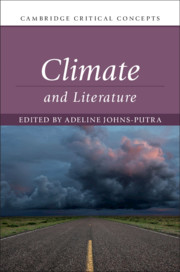Book contents
- Climate and Literature
- Cambridge Critical Concepts
- Climate and Literature
- Copyright page
- Contents
- Illustrations
- Contributors
- Acknowledgements
- Introduction
- Part I Origins
- Part II Evolution
- Chapter 7 Weather and Climate in the Age of Enlightenment
- Chapter 8 British Romanticism and the Global Climate
- Chapter 9 The Literary Politics of Transatlantic Climates
- Chapter 10 Climate and Race in the Age of Empire
- Chapter 11 Ethereal Women: Climate and Gender from Realism to the Modernist Novel
- Chapter 12 Planetary Climates: Terraforming in Science Fiction
- Chapter 13 The Mountains and Death: Revelations of Climate and Land in Nordic Noir
- Part III Application
- Bibliography
- Index
Chapter 11 - Ethereal Women: Climate and Gender from Realism to the Modernist Novel
from Part II - Evolution
Published online by Cambridge University Press: 31 July 2019
- Climate and Literature
- Cambridge Critical Concepts
- Climate and Literature
- Copyright page
- Contents
- Illustrations
- Contributors
- Acknowledgements
- Introduction
- Part I Origins
- Part II Evolution
- Chapter 7 Weather and Climate in the Age of Enlightenment
- Chapter 8 British Romanticism and the Global Climate
- Chapter 9 The Literary Politics of Transatlantic Climates
- Chapter 10 Climate and Race in the Age of Empire
- Chapter 11 Ethereal Women: Climate and Gender from Realism to the Modernist Novel
- Chapter 12 Planetary Climates: Terraforming in Science Fiction
- Chapter 13 The Mountains and Death: Revelations of Climate and Land in Nordic Noir
- Part III Application
- Bibliography
- Index
Summary
This chapter examines Charlotte Brontë’s Villette (1853), Dorothy Richardson’s Pilgrimage (1915–1938), and selections of non-fiction writing by Virginia Woolf published between 1919 and 1925. It argues that the fluid psychology we traditionally associate with twentieth-century experiments in literary form begins with the impact of nineteenth-century climate science on realist fiction. The atmospheric modes of female consciousness and ethereal embodiment that women’s presumed sensitivity to climate engenders in novels like Jane Eyre and Bleak House thus give rise to later, feminist engagements with female authorship such as Richardson’s and Woolf’s. Taking May Sinclair’s pioneering use of the term ‘stream of consciousness’ to describe Pilgrimage in 1918 as a pivot point, the chapter connects Richardson’s acknowledged debt to Villette with the climatic underpinnings that inform Woolf’s responses to both of these novels as well as her famous definition of modern fiction as ‘an incessant shower of innumerable atoms’.
Keywords
- Type
- Chapter
- Information
- Climate and Literature , pp. 179 - 195Publisher: Cambridge University PressPrint publication year: 2019
- 1
- Cited by

